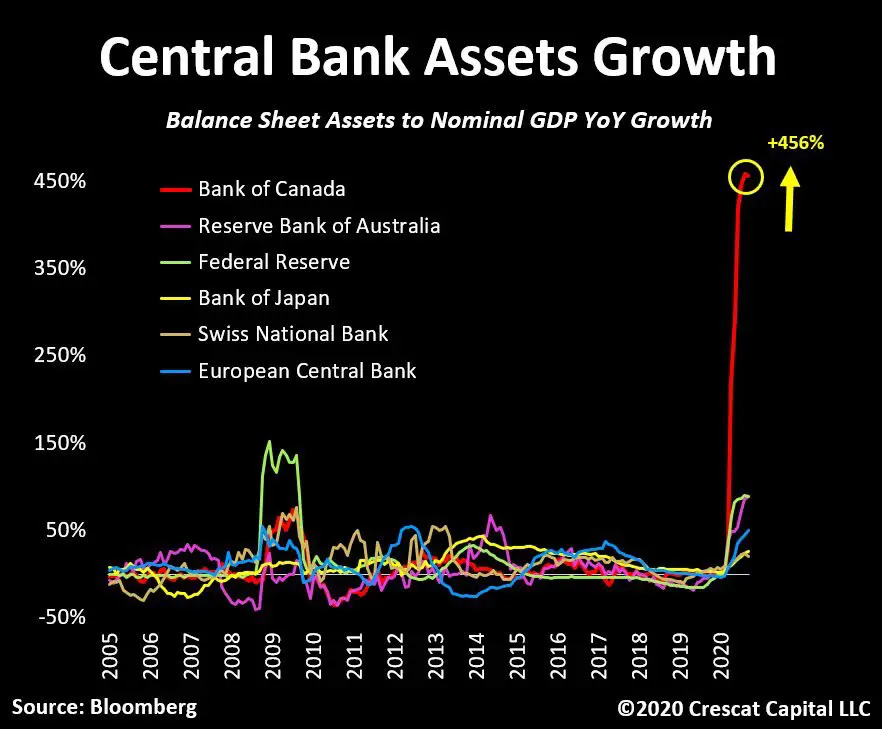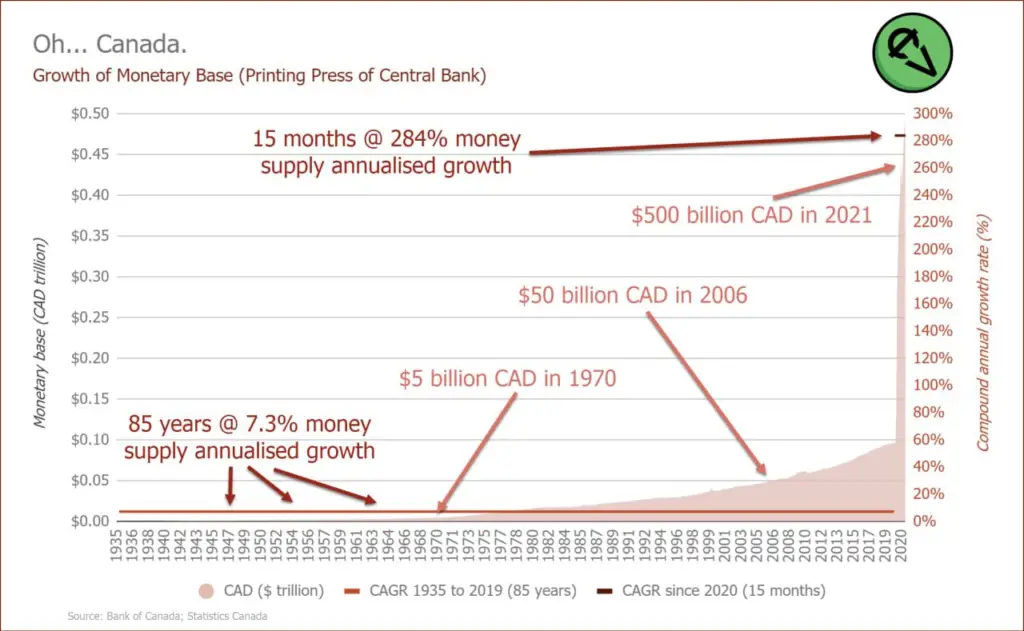The more our currency is divorced from any tangible reality, the more distorted and broken our economy will become.
One of the surprising things about our world is how few people truly grasp the nature of our ‘money.’
There is a sense that it is real, that it’s based on something.
That’s because it is human nature to believe that money – generally a reward – must be generated by activity, by something real and tangible.
However, while actual production (and actual true wealth) must be generated by human action, money itself is increasingly divorced from that reality.
After all, it’s called ‘fiat currency’ for a reason.
Our money only has value because the government decrees it to have value, and because people agree.
Of course, as Ben Bacque at Canadian MoneySaver writes, it wasn’t always this way:
I remember as a youth learning about money reading the words “Pay to the Bearer on Demand” on our Canadian bills, and noticing the words disappear in 1969, and seeking to understand what that meant. I now understand. Our money-concept currency-placeholder today, the “dollar” is created solely by act of fiat. It is simply a promise by all Canadians to each other and to foreigners, imposed upon us by the government we elect, that we will accept the currency for our goods and services. Further we are required to submit our taxes in this currency. We expect others to honour it, but we can no longer demand of our banks that they produce a fixed amount of real money, i.e. gold or silver, when presented with bills. This is a recent development. I can remember it happening.
Bacque then goes on to explain how money is created:
“Our currency is now created by debt. Our supply of currency is created initially by the Bank of Canada when it issues currency and buys with it Government of Canada debt. Only a small fraction, perhaps 5% of Canada’s money is created this way. The rest is created when we enter into debt with the banks. When I get a loan, the bank creates two entries on its balance sheet, an asset – my debt, and a liability – the demand-deposit balance that lands in my account. And money (strictly, currency) is thus created as the balance sheet expands. Amazing, isn’t it? Yet that truly is how our money supply is now created. I will leave it as an exercise for the reader to figure out from whence comes the extra money needed to pay the interest on the money borrowed in a previous period.”
The fact that many currencies – including the Canadian Dollar and the US Dollar – were once linked to the price of gold, and then imposed at least some restraint by having fixed exchange rates, was part of the rapidly increasing prosperity we once experienced.
It is only since the 1970’s that the link between productivity and wages has been severed.
Now, even when productivity goes up (something Canada is struggling with at the present moment), wages go up much slower, or don’t go up at all (when adjusted for inflation).
Indeed, as a recent ZeroHedge article points out, it’s no coincidence that the move to completely free-floating fiat currencies tied to nothing whatsoever has resulted in negative outcomes:
“It’s not as if we haven’t been here before. The question of whether rules-based monetary stability historically delivers better economic results in terms of increasing middle-class incomes than relying on the discretionary judgment of central bankers has been wholly analyzed and resolved.
In the 2015 Economic Report of the President issued under the Obama administration, a special section describes the period from 1948 to 1973 as the “Age of Shared Growth” — characterized by accelerating labor productivity, falling income inequality, and increased workforce participation.
The report makes little mention of the fact that this period of remarkable growth, which increased living standards across all income levels, coincided with the existence of the Bretton Woods international monetary system under which the U.S. dollar was convertible into gold at a fixed price.
The report does posit that if post-1973 productivity growth had continued at its pace from those previous 25 years, “incomes would have been 58% higher in 2013” and “the median household would have had an additional $30,000 in income.”
All of which should give pause to those who belittle the uneasiness felt by conservatives who fear that compromising monetary integrity not only violates founding principles but also economic rationality. And it’s not just conservatives per se, but rather an increasingly larger segment of the population expressing concerns about the wisdom of government officials and the correctness of government policies.”
Additionally, there is mention of how the increased attention on cryptocurrencies represents people seeking alternatives to the endless fiat-printing of central banks – which have become increasingly politicized:
“The momentum behind the rise of cryptocurrencies is being fueled by populist aspirations to decentralize finance in the name of democracy — in radical defiance of central bank polices that are perceived as favoring big investors, big business, and big government.
Even as the Fed appears to be signaling its willingness to comply with a progressive agenda that would enlist our nation’s central bank in efforts to focus on climate change or systematic racism, there is growing skepticism that the solution to such problems is to be found in Fed purchases of Treasury debt and government-backed mortgage securities.”
Now, the article above talks about the ‘uneasiness’ felt in the United States, amid immense money printing and a big surge in government spending.
However, things are far worse in Canada.
As you can see in the charts below, the balance sheet of the Bank of Canada has grown by an astonishing amount:


And here in Canada – like in the US – the central bank has become an increasingly politicized tool of the federal government.
After all, the massive surge in spending we’ve seen, and the debt piling up at all levels, is something that a central bank should be discouraging, through higher interest rates.
Instead, the Bank of Canada has kept rates extremely low, in effect enabling fiscal irresponsibility at all levels.
Now, if our currency was actually linked to something tangible, it would impose restraint without the need for endless intervention.
Alternatively, if there were fixed limits on how much money could be created by the Bank of Canada in a given year, there would at least be a sense of some scarcity – which is essential to the creation of value and stability.
In the absence of either of those things, what we end up with is money completely divorced from any sense of tangibility or reality, which starts to influence our thinking in very negative ways.
Calls for a Universal Basic Income wouldn’t be happening if there was scarcity and tangibility imposed on our currency. Only in a world where money can be endlessly created out of thin air would people feel entitled to a constant and large payment from the state without having worked for that money.
Conservatives need to advocate for a return to sound money
Conservatism – among other things – is about restraint.
Restraint in action and restraint in spending.
Yet, convincing people of the importance of restraint is incredibly difficult when money creation seems to have no limits.
A combination of a weak education system, and a political/banking/corporate class that is addicted to easy money, weakens our entire society, and makes restraint a ‘bad word.’
Conservatives need to start advocating for Canada to return to sound money, and warn about the serious danger and risk of a crisis that the easy-money, free-spending establishment is causing.
Fantasy or reality?
Will Canada continue to live in a fantasy world – with our delusions only ended through a brutal crisis – or will we wake up ahead of time and embrace reality?
So far, the indication is that most people are choosing the former, and will push forward with this experiment in monetary and financial irrationality until our money has lost all credibility. Still, we can spread the word about the importance of sound money and do our best to wake enough people up before it’s too late.
Spencer Fernando
***
If you value my independent perspective, a financial contribution is deeply appreciated. You can contribute through PayPal, or directly through Stripe. Thank you.
[simpay id=”28904″]
